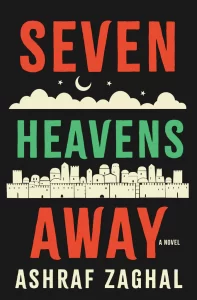Anansi
Review by Brian Tanguay

Three Palestinian teenagers are hanging out on the streets of Jerusalem. They insult one another as teenage boys do, smoke cigarettes, and enjoy ice cream cones. Hassan is an intelligent computer whiz worried that his parents will be angry if he gets home after dark. Mustafa, the oldest at sixteen, is bolder than his friends, and carries an ID card while they still carry their birth certificates. The third member of this trio is Aziz, a sensitive boy in the process of finding himself. Across the street, four Israeli Border Patrol soldiers carrying rifles keep an eye on the crowd. A passerby gives the boys a strange look, as if they’re monsters with horns. Suddenly, shots ring out and Hassan falls.
What follows is a story of grief, anger, and the struggle to cope with constant oppression. Sometimes the oppression is merely the presence of patrolling Israeli soldiers, blocked streets and checkpoints; at others it is embodied by Captain Moussa, who needs no reason to arrest and jail a Palestinian. Maintaining tension is something Ashraf Zaghal does brilliantly in this debut novel. Through the perspective of Aziz, readers feel the claustrophobia of the old city that pervades everyday life. Presented as a diary, the novel spans a period from the Fall of 2015 to the Spring of 2016. In this period Aziz falls under the sway of Abu-Hassan and joins the Circle of Sincere Hearts, a Muslim youth group that meets regularly.
Abu-Hassan tells Aziz that he has an eager soul. While true, Aziz is also a teenage boy with normal teenage desires and urges. He becomes enamored with Dafna, a lovely Jewish girl who works in a cafe with Mustafa’s brother. Dafna is not hell bent on driving every last Palestinian from Jerusalem as are Captain Moussa and the Israeli settlers. On the other hand, extending friendship to a Palestinian boy doesn’t cost her anything. Aziz thinks constantly about Dafna, though he knows his ruminations are based on false desires; they also draw the ire of Mustafa who thinks no Jew can be trusted.
For Mustafa and Aziz and their friends the temptation to become radicalized is ever present. All around them, every day, they see how Palestinians are marginalized, spied upon, rendered powerless to change their circumstances and fashion a future. After a stretch in jail Mustafa emerges with fewer reasons to resist the temptation to retaliate against his oppressors. “Sometimes,” Mustafa says, “I feel like bringing down the whole thing with my bare hands. I don’t even want to finish it anymore. I don’t care. I’m done.” Not long thereafter Mustafa makes a clandestine arrangement to acquire a gun.
It doesn’t take Captain Moussa long to catch up with Aziz and arrest him. He knows about the gun. Aziz is interrogated and manhandled by guards who cover his head with a bag that reeks of animal dung. Moussa informs Aziz that Mustafa is dead. When Aziz is released he’s in rough shape, scarred by his experience, by sounds and smells he can’t forget. He’s known now as the friend of the martyr.
As Aziz draws ever closer to jeopardy his relationship with his family suffers. His father, a taxi driver, orders him to stay away from politics. The older man is painfully aware of the pitfalls in store if Aziz continues on the path he’s on; he knows that prison or death is the way it usually ends for Palestinian political activists. It’s not that he doesn’t understand what his son is feeling. He too once read Islamic books and listened to rabble-rousing speakers. He tells Aziz about his student days, when he hoped to become a teacher. “But I had a file. Some security officer, the Captain Moussa of that time, prevented me from teaching. Then things went from bad to worse — explosions, demolitions, arrests. Ten times what you see now, the most hopeless of times.” History, Aziz’s father goes on to say, taught me not to trust charlatans, especially in this land of ours.
What is a boy to do when fear and despair is his inheritance? What are parents to do when their hopes for their children are inhibited from the day they’re born? How is one to remain hopeful in the face of repeated betrayals? These are the questions Ashraf Zaghal and his characters confront in this assured and superbly crafted novel.
